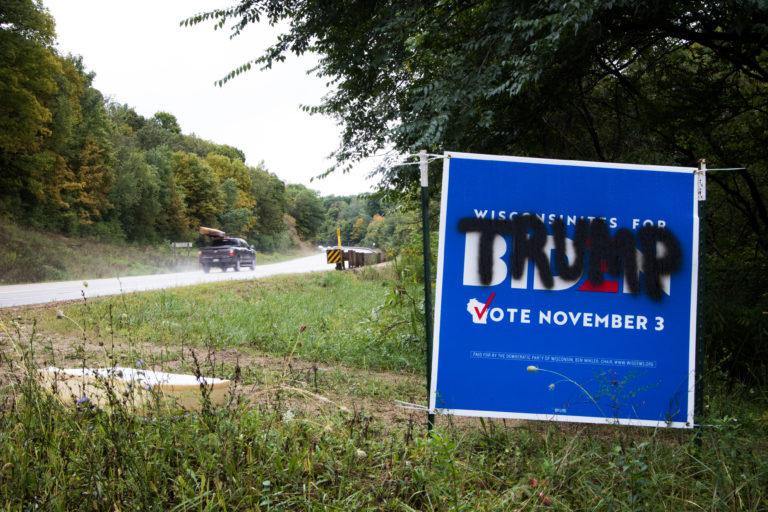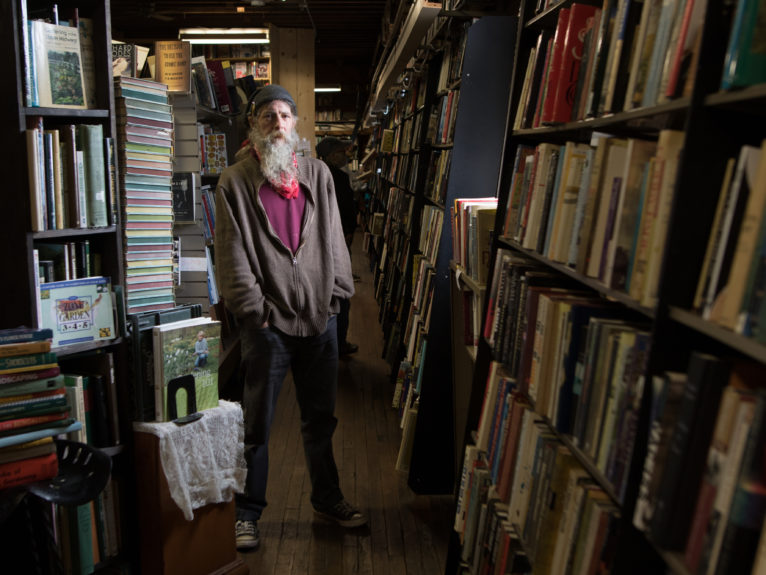Libertarians and anarchists for Trump
Adnan R. Khan: In Organic Valley, America’s anti-establishmentarians, from the left and the right, converge in support of Donald Trump

As you leave the town of Viroqua, things turn decidely pro-Trump. The county voted majority Obama in 2012 but then flipped to Trump in 2016. (Photograph by Adnan R. Khan)
Share
“I don’t believe in the political spectrum as a line,” Eddy Nix, 51, a life-long anarchist and owner of Driftless Books and Music in Viroqua, Wisconsin, tells me. “It’s a circle. As an anarchist I’m just as pissed off by about 80 per cent of the things Trump voters are.”
In Viroqua, Nix represents a species of swing voter that may turn the November presidential election one way or the other. In 2016, he says he watched Donald Trump’s rise with “giddy excitement,” not so much because he saw any hope in Trump but because he had become so cynical of the political system after the “failure” of Barack Obama to deliver on his promise of “hope and change.”
“I was like, well, the whole system is gonna collapse anyway so why not have this guy come in and speed it up,” he says. “I know it’s a terrible attitude but you get to the point where you’re so cynical about the system that blowing it up doesn’t sound so bad, right?”
Anti-establishmentarianism is a popular political flavour in Viroqua, a weird and wacky small town not far from the home base of Organic Valley, the world’s largest cooperative of family farmers, where Trump voters, libertarian homesteaders, leftists and liberal back-to-basics urbanites converge in an eclectic political stew. In 2012, Vernon county, of which Viroqua is the largest town, voted solidly for Barack Obama—56.5 per cent—in large part because it seemed like a young, black president was about as far as you could get from the old-white-man establishment. In 2016, it flipped to Trump—49.3 per cent—in what locals tell me was a rebuke to Obama’s establishmentarian ways.

“I watched the Trump rise sympathetically,” Joseph Ecklund, 34, chairperson of the Libertarians of Southwest Wisconsin, tells me. “I sympathize with the concerns over corporate power. I sympathize with concerns over military interventionism and I sympathize with the plight of American workers and their sense that they don’t have social credit that they used to have. Obama promised to get out of foreign wars but he only deepened America’s involvement in overseas conflicts. He claimed to speak for the common man but ended up a good friend of the corporations.”
Neither Nix nor Ecklund plan on voting for Trump but they both know plenty of people who will–Libertarian Party voters who believe Trump will, despite all of his flaws, bring the U.S. closer to their minimal-government ideal, anarchists who, like Nix, want to the whole damn thing to come crumbling down, and even a Bernie Sanders supporter here or there who would rather see a bull wrecking the White House than another vanilla-flavoured neoliberal reclaiming the throne.
“I have relationships with Trump supporters and it’s almost always been about the corporate establishment for them,” Ecklund says. “Trump has so much money that he can’t be bought, and it’s so much better to have an imbecile breaking the system than to have a system continue to exploit the lower and middle classes to serve the special interests, the banks and the military industrial complex. That’s been the narrative for every Trump supporter I know.”
New York Times revelations that Trump doesn’t have as much money as he claims and that he has been reporting massive losses from his core businesses to avoid paying taxes won’t change their minds, Ecklund adds. Firstly, in their eyes, this is the New York Times, a “fake news” mainstream media outlet that has been working with the Deep State for years to take Trump down. Secondly, the revelations only reinforce the narrative of an anti-tax president. “From the Libertarian perspective, he’s just being consistent,” he says. “He’s against taxes and he’s found ways to get out of that extortion racket.”
The fiction may seem preposterous to rational thinking humans but there are still large segments of the U.S. population that buy into the myth of the American frontier spirit, where a man is a man and he makes his way in this world through his own labour and determination and no one, especially no damn authorities, can stop him. Trump is their new champion.
In Viroqua, and more broadly in Vernon county, this frontier spirit comes naturally. Many of its residents came into the area to escape the structures modern life imposed on them, to get closer to the land and build something themselves. Nix was one of the early urban homesteaders to come in during the late 1980s. Together with others, he established the local Waldorf high school where he taught drama.
Charlene Elderkin, who also helped set up the school and now works in the local cooperative supermarket in Viroqua, says it’s not necessarily a question of anti-government sentiments that drives the local community but simply a lack of government.
“There’s already a spirit here of doing,” she says. “There’s not much government to begin with so when something needs to be done, like setting up a Waldorf school, people just get together and do it.”
Nix concedes that there was a time he would have snubbed any contact with conservatives but living in Viroqua and running his own business where he interacts with Trump supporters daily has helped him dig a little deeper. He’s now arrived at a place where instead of rigid categories, he’s found an entire universe of personalities and world views.
“Conservatives are still people,” he says. “They’ll stop and help you if your car breaks down. But there are so many myths these days, and they’re equally toxic on both sides. Suddenly, these Trump voters are your enemies and Nazis and it’s like, no man, they’re your neighbours.”
Still, Nix is dumbfounded by their continued support for Trump after what he calls years of broken promises and lies. But he also understands, and in many ways, supports their desire to disrupt a dysfunctional political system. The establishment must fall, he says. Everyone at least agrees on that.